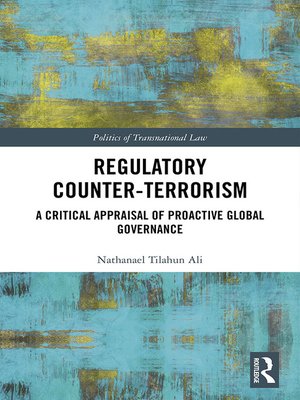Regulatory Counter-Terrorism
ebook ∣ A Critical Appraisal of Proactive Global Governance · Politics of Transnational Law
By Nathanael Tilahun Ali

Sign up to save your library
With an OverDrive account, you can save your favorite libraries for at-a-glance information about availability. Find out more about OverDrive accounts.
Find this title in Libby, the library reading app by OverDrive.



Search for a digital library with this title
Title found at these libraries:
| Library Name | Distance |
|---|---|
| Loading... |
Regulatory Counter-Terrorism explores an emerging terrain in which the global governance of terrorism is expanding. This terrain is that of proactive regulatory governance – the management of the day-to-day activities of individuals and entities in order to pre-emptively minimize vulnerability to terrorism. Overshadowed by the more publicized dimensions of military and criminal justice responses to terrorism, regulatory counter-terrorism has grown in size and impact without stirring up as much academic debate.
Through a critical assessment of international regulatory counter-terrorism in three areas – financial services, the control of arms and dangerous materials, and the cross-border movement of persons and goods – this volume identifies a dynamic trend. This is the refashioning of international rule making into a flexible and experimental exercise. This volume shows how this transformation is affecting societies across the world in new ways and in the process unravelling settled understandings of international law. Furthermore, through an in-depth analysis of the working processes of UN counter-terrorism bodies and the Financial Action Task Force, this book illustrates that the monitoring of the global counter-terrorism regime is, contrary to accepted understanding, in the main collaborative and managerial, and coercive only peripherally. Dynamic rule making and soft monitoring complement each other, but this is a reason for concern: the softening of international monitoring encourages regulatory adventurism by states in tackling terrorism, while the element of self-correction in dynamic rule making helps silence the calls for institutionalized mechanisms of accountability.
This volume will be of great interest to students and scholars of counter-terrorism, security studies, global governance, and international law.







